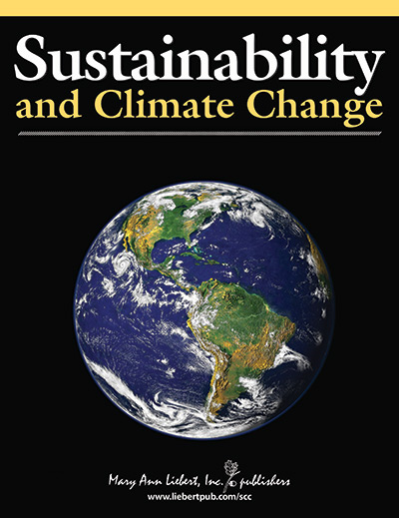Special Issue on Pandemics, Socially Equitable Economic Advancement, and Resilient and Sustainable Systems
Guest Editors:
Adjo Amekudzi-Kennedy, PhD
Professor, F. ASCE, NAC
Associate Chair, Global Engineering Leadership & Entrepreneurship
School of Civil & Environmental Engineering
Georgia Institute of Technology
Bernard Combes
Programme Specialist
Education for Sustainable Development (ESD)
Education Sector Focal Point for Biodiversity
UNESCO
Paris, France
Jamie Fischer, PhD
Director of Transportation Performance and Innovation
State Road and Tollway Authority (SRTA)
Georgia Regional Transportation Authority (GRTA)
Atlanta-region Transit Link Authority (ATL)
Paper Submission Deadline: March 12, 2021
Sustainability and Climate Change invites you to contribute to a special issue focused on pandemics, socially equitable economic advancement, and resilient and sustainable systems.
Social Equity
As of February 10, 2021, the novel coronavirus has claimed 461,610 American lives and nearly 2.4 million lives globally, according to the World Health Organization. The data shows deep inequities by race, most dramatically for Black Americans.1 In the U.S., majority-black counties have experienced nearly six times the rate of deaths as white-majority counties.2 Other vulnerable populations include indigenous people—in the Navajo Nation, the rate of infection is roughly five times that of the country as a whole.3
Environmental
Air pollution has been dramatically reduced since governments implemented stay-at-home orders.4 In China, it’s been found that interventions to contain the viral outbreak led to “air quality improvements that brought health benefits which outnumbered the confirmed deaths due to COVID-19.”4 Other environmental and environmental health issues have been highlighted by the pandemic; for example, the importance of access to clean water to prevent the spread of disease.5 Notably, even as attention is singularly focused on the pandemic as well as on the reduction of pollution, the major sustainable development challenges—climate change, biodiversity loss, unsustainable food systems, water quality degradation—remain unresolved.
Economic
According to the IMF, the ‘Great Lockdown’ is the worst recession since the Great Depression. Impacts include job and income loss as well as disruption to domestic and global supply chains across many industries. Impacts to food supply and manufactured household goods have the side effect of raising prices and further exacerbate the economic pressures experienced by individuals and households. Still, global growth and partial recovery is projected in 2021.6
Education
Restarting the world’s economies may be a once-in-a-lifetime opportunity for a green transition. If countries decide to rebuild in a sustainable way, the demand for green skills will increase in the coming years, with education being integral in the transition. Beyond skills training, new educational spaces and opportunities will also be needed for diverse communities of thought to come together and contribute to the framing of new, more sustainable economies centered on well-being.
Considering the above indicators, policymakers and stakeholders at all levels—in education, government, industry, and community groups—have an open opportunity to foster resilient and sustainable systems by way of socially equitable economic development. The crisis response also reminds us of the need for a participatory, whole-of-society response, as opposed to top-down state action only. A massive move towards sustainable development will only be possible if all of society is on board.
In this special issue, we will explore the impacts of the pandemic, how it has revealed injustices across economic advancement and other sustainability measures, and how it may inform risk-based and opportunity-based best practices that move communities toward sustainable prosperity.
Suggested topic areas include, among others:
- COVID-19 and sustainable development
- Pandemics and health equity issues
- UN SDGs7 and post-pandemic communities
- Socially equitable economic development
- Building pandemic- and climate-resilient communities
- Community-driven solutions for resilient and sustainable systems
- Equitable and economically advanced communities
- Equitable, resilient, and sustainable infrastructure
- Relationships among economic and health equity and community resilience
The editors request manuscripts should be submitted online by March 12, 2021. All submissions will be subject to a rigorous peer review. We encourage submissions of original research articles, reviews, case studies, and thought pieces and perspectives.
Visit Sustainability and Climate Change online to learn more, read past issues, and view author submission guidelines.
Questions?
Please contact the Journal Editorial Office.
References
- APM Research Lab. The Color of Coronavirus: COVID-19 Deaths by Race and Ethnicity in the U.S., June 10, 2020.
- Thebault R, Ba Tran, A, Williams V. The coronavirus is infecting and killing black Americans at an alarmingly high rate. April 7, 2020. The Washington Post.
- Letzing J. This is how COVID-19 is affecting indigenous people. The World Economic Forum.
- Zambrano-Monserratea MA, Ruano MA, Sanchez-Alcalde L. Indirect effects of COVID-19 on the environment. Sci Total Enviro 2020;728:138813.
- Water, sanitation, hygiene, and waste management for the COVID-19 virus: interim guidance. The World Health Organization and UNICEF.
- Gopinath G. The Great Lockdown: Worst Economic Downturn Since the Great Depression. IMF Blog. Sustainable Development Goals (SDGs). The United Nations.
